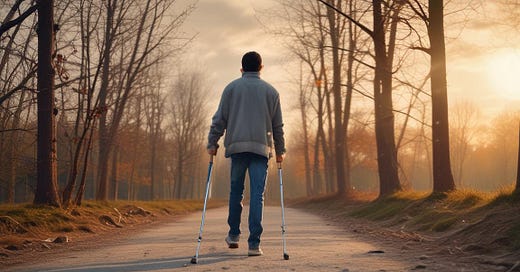To What End?
In the last few weeks, I have been reading about struggles some people are having with their mobility. Whether through a progressive disease or a severe chronic illness, they are losing or have already lost the ability to walk or walk much farther than from the bed to the bathroom and back.
Yet, despite these limitations, they are hesitant to get a wheelchair, powered or manual. Even when they start to make decisions, they still hesitate. Internalized ableism says to them:
Are you giving in to your disability?
Are you being weak?
What kind of equipment can I afford, and how will that choice impact the rest of the family?
Maybe I should tough it out a little while longer.
Here is what I think, based on a lifetime of disability.
When I was a little girl, doctors (and my parents) thought it was better to walk with difficulty and almost daily blisters and pain than to use a wheelchair. So, I was never given the option. Even though my skin’s obvious differentness precluded me from ever passing for “normal,” doctors still thought it was more normal to walk with pain and an odd gait than to sit down and move through the world with less pain and more freedom. RCW Origin Story, part 1
Even though I had physical therapists in special education, none of them had the wit to figure out:
I had less pain and less suffering when I used a wheelchair.
Because I was struggling less to get around, I had more energy.
I was happier.
When I was walking, I was afraid of falling all the time—my gait was odd, and my balance wasn’t great. I was also scared of other kids crashing into me and knocking me over. (When I fall or scrape my skin, a large strip of the top layer of my skin comes right off—raw skin, then new skin. It is stiff, prone to cracking, sticking to my clothes, and getting infected.)
Fast Forward to Now
I have multiple wheelchairs. Some I have paid for, and some my health insurance has paid for.
Inside the house
I have a relatively inexpensive manual chair for inside the house. The seat is only 18 inches wide, which is not wide enough for me, but with the rims removed from the big pusher wheels, I can get through doorways—barely.
When I go out, I transfer from the indoor chair to my stair lift. I can hang onto stuff and make this transfer with minimal help. I bought the stairlift and the manual chair with tax-differed savings for health care expenses. When I am at the bottom of the stairs, I get into my power chair.
Outside and Local Travel
My main power wheelchair was paid for by my insurance, and the markup to the insurance from an approved vendor is around 30%. It has special cushion for my back and came with rigid seat and fancy cushion. This chair doesn’t fold. With the batteries, I think it weighs around 250 lbs.
I have a wheelchair van with a foldout ramp that my parents helped me pay for about fifteen years ago.
I also commuted in the power wheelchair using light rail and commuter rail before I had the van.
Experimentation
I have purchased numerous travel wheelchairs and scooters over the years, with the annual tax-differed savings account I had when I still worked. They were all dissatisfactory for one reason or another: too tippy, too underpowered, too heavy, too uncomfortable to sit on for the requisite hours in a travel day.
I was lucky that I could afford to experiment.
If you can work out the money, you will probably want at least two chairs, one manual and one powered. If you want to into rough terrain, an “off-road” wheelchair might be the ticket, but you need think about size for use on public transit; in those situations, bigger is not better.
If you are paying out of pocket, there are some excellent online vendors. Secondhand equipment is also possibility—I have both gifted and sold some of my old equipment.
This is a No Martyr Zone
Architectural barriers and lack of funds are legitimate obstacles to getting the right equipment. Doctors being assholes is another thing that takes a battle sometimes.
But, fighting with yourself about “am I really this disabled now,” particularly if it is an internal argument that has been going on for years—well, we just don't have time for that anymore.
It isn’t about being more or less disabled as it is about being really fucking good at whatever level of disability you are at.





Hurray for wheelchairs! They are awesome! They help us get to where we need to go, support our bodies, and live our lives!
You are completely right, of course. I have a man coming on Thursday to, sort me out hopefully. I do deserve a good life and if a power wheelchair facilities that then that’s what I need. Well written piece Teri